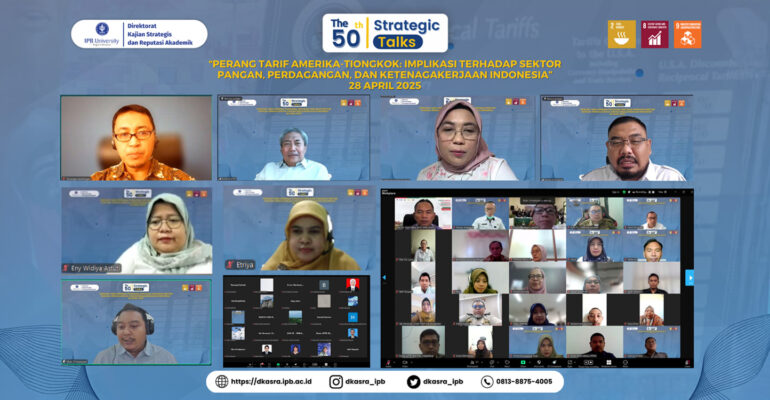IPB Strategic Talks: Experts Highlight Impact of US-China Trade War on Indonesia’s Food and Labor Sectors

The ongoing trade war between the United States (US) and China continues to escalate. In response, IPB University, through its Directorate of Strategic Studies and Academic Reputation (DKSRA), held a discussion featuring experts and economists to examine the implications of this trade war on Indonesia’s food, trade, and labor sectors.
As is known, the US has imposed a 32 percent tariff on Indonesia due to its trade surplus. In response, the Indonesian government has chosen diplomatic channels to seek mutually beneficial solutions.
These tariffs are expected to affect various sectors, particularly food, agriculture, trade, and labor. According to Prof Bustanul Arifin from the University of Lampung, the trade war’s impact is especially evident in the food sector, particularly soybeans, which are heavily imported from the US.
“Decreasing demand from the US allowed Brazil to take over import contracts, which in turn drove up global soybean prices, including in Indonesia. This has also led to rising prices of vegetable oils,” he explained during the 50th IPB Strategic Talks (4/28).
Moreover, the trade tensions are affecting other sectors such as textiles, footwear, and furniture. As a result, Indonesia faces stiff competition from countries with lower production costs, such as Vietnam.
On that occasion, Dr Widyastutik, Secretary of the International Research Institute for Social, Economic, and Regional Development at IPB University, discussed the opportunities and challenges Indonesia faces in the global economy due to the trade war.
“This trade war opens opportunities for Indonesia to become an alternative supplier for products previously imported from China, particularly in the furniture sector. However, the main challenge lies in the declining competitiveness of Indonesian export products even before the tariffs were imposed,” she said.
Despite the difficulties, Indonesia can still use this situation to strengthen its position as a producer of goods needed in the global market. Indonesian textile and furniture products, for instance, could become more competitive if US import tariffs are reduced.
From the labor perspective, Dr Deniey Adi Purwanto, an Economics lecturer at IPB University, stated that the trade conflict may have repercussions for Indonesia’s workforce.
“Decreased demand from the US could lead to reduced production in export-reliant sectors such as textiles and electronics, potentially increasing unemployment or reducing workers’ hours,” he explained.
Nonetheless, he added, despite the significant challenges, Indonesia still has opportunities to optimize the positive impacts of global trade dynamics.
In this regard, improving the investment climate, enhancing workforce skills, and upgrading infrastructure are key to ensuring Indonesia remains competitive in the global market.
In his opening remarks, Prof Anuraga Jayanegara, Director of KSRA at IPB University, stated that the main goal of the event was to explore research- and data-based insights from experts. This is crucial for identifying strategic opportunities for Indonesia amid global trade tensions and shifting trade flows.
In facing the evolving US-China trade war, Indonesia must be able to identify existing opportunities while mitigating negative impacts on affected sectors.
The government is expected to continue negotiations and diplomacy with major countries to maintain trade stability while taking advantage of opportunities in specific sectors.
Discussions and studies like those conducted by IPB University are hoped to offer concrete solutions to the current global challenges. (IAAS/RWA)


